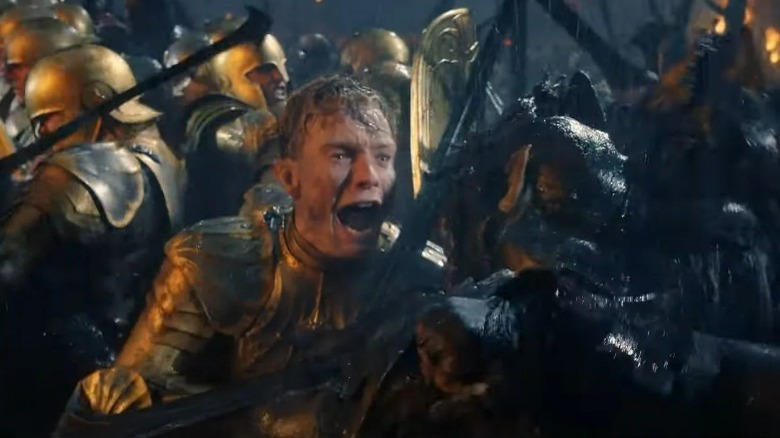How The Rings Of Power Showrunners Worked Around Their Lack Of Rights To The Silmarillion
With eight total episodes to its name, the first season of Amazon Prime Video's "The Lord of the Rings: The Rings of Power" is officially in the books. Suffice to say, it gave audiences quite a few surprises along the way while simultaneously holding onto more than its fair share of secrets. After all, with a second season on its way, the showrunners had to leave behind some story threads for fans to chew on for a while. At the same time, the program has yet to explore several key stories that will forever change the course of Middle-earth.
The important thing to know about "The Rings of Power" is that it covers an era known as the Second Age, where Sauron returned from the shadows and the Elves, Men, and Dwarves struck up shaky alliances to keep Middle-earth safe. This time period falls between the First Age and the Third Age, where "The Hobbit" and the "Lord of the Rings" trilogy take place. Unlike the Third Age, though, the First Age remains largely unexplored in live-action since "The Silmarillion" covers it at length– a book Amazon doesn't have the rights to adapt.
Despite needing the groundwork of the First Age to tell the Second Age story of "The Lord of the Rings: The Rings of Power," the showrunners managed to skirt around their legal inability to adapt "The Silmarillion" directly.
The showrunners touched on the First Age without adapting the Silmarillion
In an interview with Esquire, "The Lord of the Rings: The Rings of Power" showrunners J.D. Payne and Patrick McKay touched on all that went into telling a story set during the Second Age of Middle-earth. To them, the context of the events of the First Age was paramount to telling this tale, but they couldn't use the "Silmarillion" story beats outright. So, they decided to turn to the J.R.R. Tolkien writings they did have the rights to. "The stories of the First Age are contained within that material in abbreviated form. So that history and that mythos is part of 'Lord of the Rings,' even if you never read 'The Silmarillion,'" McKay revealed.
As long as they stayed within the confines of what's mentioned of the First Age in "The Hobbit" and "The Lord of the Rings: Return of the King," they were golden. McKay adds that at the end of the day, the First Age was too massive and complex to be done justice on "The Rings of Power" anyway, so they offered audiences the cliff notes version instead. Payne likens the situation to music, saying, "If you're a fan, your mind will fill in the drumbeat underneath it because you know what stories were there...It's a constant dance of wanting to make sure that it harmonizes and doesn't contradict, but also doesn't use things we don't have the rights to."
"The Silmarillion" is a fascinating read for those dedicated to fully immersing themselves in the history of Middle-earth. Hopefully, someday we'll get a proper adaptation of it that'll flesh out the broad strokes presented by "The Lord of the Rings: The Rings of Power."

